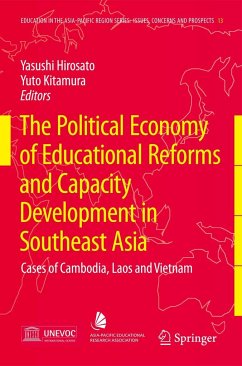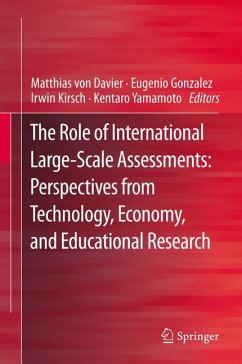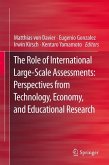This book presents policy debate and analysis of educational reform context, process, and capacity - mainly in Southeast Asian countries - and calls for a new political economy of educational reforms and capacity development. The conceptual/analytical framework addresses both the efficiency and equity dimensions of educational reforms; encompasses all the stakeholders in the process of educational reforms; and suggests whose capacity needs to be developed. Country cases, targeting Cambodia, Laos and Vietnam and featuring Southeast Asia/country experts as contributors, offer in-depth analyses of the dynamics of educational reform context, process and capacity, and examine efficiency, equity, and quality issues in basic and higher education.
This book is a highly relevant source of information for education policy makers and planners, and will help researchers to understand the innovative way to analyse educational reforms and capacity development in developing countries.
Yasushi Hirosato and Yuto Kitamura Developing countries, including Southeast Asian countries, face an enormous challenge in ensuring equitable access to quality education in the context of deepening globalization and increasing international competition. They must simultaneously meet the goals of Education for All (EFA) at the basic education level and of developing a more sophisticated workforce required by the knowledge-based economy at the post-basic, especially tertiary, education level. To meet this challenge, developing countries need to reform/renovate their education systems and service deliveries as an integral part of national development. However, most of them have not yet fully developed the individual, institutional, and system capacities in undertaking necessary education reforms, especially under decentralization and privatization requiring new roles at various (central and local, or public and private) levels of administration and stakeholders. Provided that an ultimate vision of educational development and cooperation in the twenty-first century would be to develop indigenous capacity in engineering education reforms, this book analyzes the overall education reform context and capacity, including the status of sector program support using the sector-wide approach (SWAp)/program-based approach (PBA) in developing countries. We also address how different stakeholders have been interacting in order to promote equitable access to quality education, particularly from the perspectives of capacity development under the system of decentralization.
This book is a highly relevant source of information for education policy makers and planners, and will help researchers to understand the innovative way to analyse educational reforms and capacity development in developing countries.
Yasushi Hirosato and Yuto Kitamura Developing countries, including Southeast Asian countries, face an enormous challenge in ensuring equitable access to quality education in the context of deepening globalization and increasing international competition. They must simultaneously meet the goals of Education for All (EFA) at the basic education level and of developing a more sophisticated workforce required by the knowledge-based economy at the post-basic, especially tertiary, education level. To meet this challenge, developing countries need to reform/renovate their education systems and service deliveries as an integral part of national development. However, most of them have not yet fully developed the individual, institutional, and system capacities in undertaking necessary education reforms, especially under decentralization and privatization requiring new roles at various (central and local, or public and private) levels of administration and stakeholders. Provided that an ultimate vision of educational development and cooperation in the twenty-first century would be to develop indigenous capacity in engineering education reforms, this book analyzes the overall education reform context and capacity, including the status of sector program support using the sector-wide approach (SWAp)/program-based approach (PBA) in developing countries. We also address how different stakeholders have been interacting in order to promote equitable access to quality education, particularly from the perspectives of capacity development under the system of decentralization.








